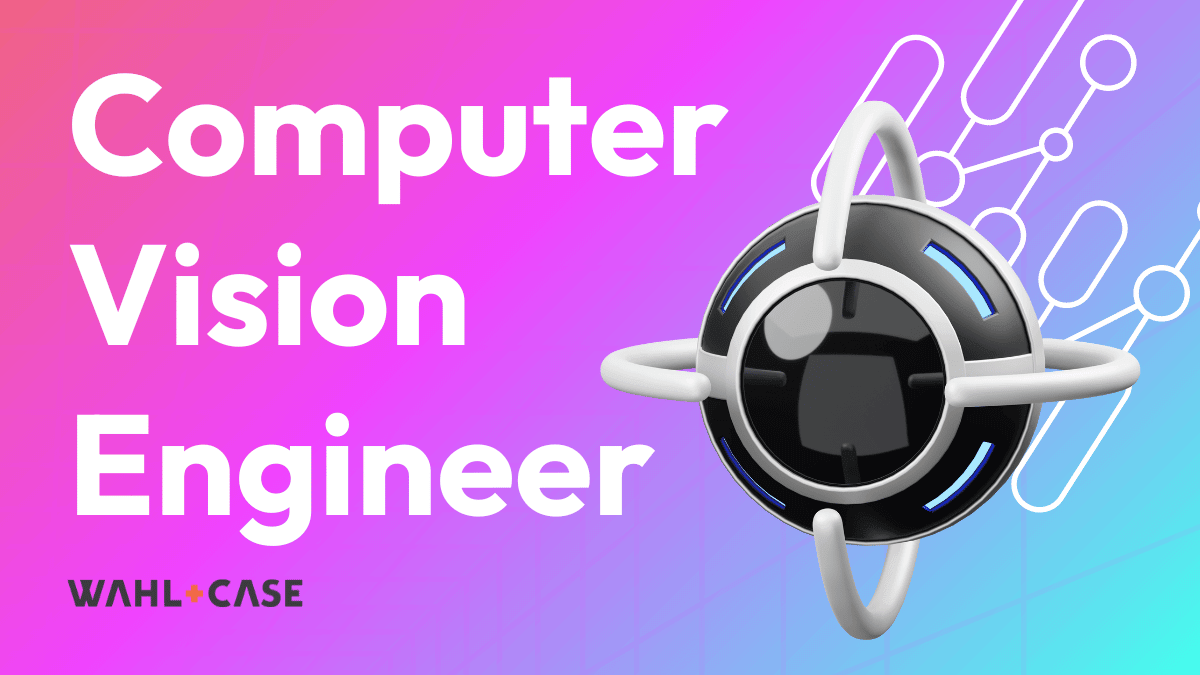Computer Vision Engineer - Position Explained
Are you considering a career as a Computer Vision Engineer? Already working in the computer vision field, but want to expand your knowledge?
You've come to the right place!
In this article, I will cover everything you need to know about being a Computer Vision Engineer, what it is, what they do, and the skills required for success.
I will also answer some FAQs as well as provide resources to help you on your career journey.
At Wahl+Case, we have helped hundreds of people land jobs at some of the biggest names in Tech. So, if you're ready to learn all about being a Computer Vision Engineer, keep reading!
What is a Computer Vision Engineer?
As a Computer Vision Engineer, your main responsibility is to develop algorithms and models that enable computers to interpret and understand visual information from the world. This includes processing images, videos, or even real-time data from cameras and sensors.
Your day-to-day tasks will involve:
Developing and implementing computer vision algorithms and models
Analyzing large datasets of images and videos to identify patterns and features
Collaborating with other engineers and researchers to develop innovative solutions
Optimizing algorithms for efficiency and accuracy
Keeping up-to-date with the latest advancements in computer vision research
What Opportunities does a Computer Vision Engineer have?
The demand for Computer Vision Engineers is on the rise as more industries recognize the value of utilizing visual data for decision-making, automation, and product development. In this section, we will explore some of the opportunities available for you in various industries.
INDUSTRIES WITH HIGH DEMAND FOR COMPUTER VISION ENGINEERS
Autonomous Vehicles: Computer vision plays a crucial role in the development of self-driving cars, as it enables vehicles to perceive and interpret their surroundings for navigation and decision-making.
Robotics: Robots often rely on computer vision to navigate, interact with objects, and perform tasks that require visual perception.
Healthcare: Computer vision is increasingly used in medical imaging for diagnosis, treatment planning, and surgical guidance.
Security and Surveillance: Companies in this sector utilize computer vision technology to analyze video feeds, detect potential threats, and improve overall security.
Augmented Reality and Virtual Reality: Computer vision is an essential component of AR and VR experiences, as it allows the technology to understand and interact with the real world. This is where our client Holoeyes is operating.
Requirements for a Computer Vision Engineer
To excel as a Computer Vision Engineer, you need a mix of technical and soft skills.
Technical Skills
Programming languages and tools: You should be comfortable working with various programming languages and tools, such as Python or C++ for algorithm development and implementation. Familiarity with libraries and frameworks specific to computer vision like OpenCV is crucial.
Image processing and analysis: A strong understanding of image processing techniques, such as edge detection, filtering, and feature extraction, is essential for this role.
Machine learning and deep learning: As a Computer Vision Engineer, you will often use machine learning and deep learning algorithms to train models and improve the accuracy of your solutions. Getting familiar with frameworks like TensorFlow, Keras, or PyTorch will be advantageous.
Mathematics and linear algebra: A strong foundation in mathematics, particularly linear algebra, is crucial for understanding underlying concepts of computer vision.
Soft Skills
Communication: As a Computer Vision Engineer, you'll often collaborate with different teams, so you need strong communication skills to effectively present your findings and insights clearly to an audience of non-technical team members and stakeholders.
Problem-solving: Being able to approach complex problems and find the most efficient solution is essential. You should be able to break down problems into smaller components and systematically analyze each part.
Critical thinking: You must critically assess the data, question assumptions, and draw valid conclusions based on the available information.
Attention to detail: Accuracy in your analysis and reporting is vital, so having an eye for detail is necessary.
Career Progression
As a Computer Vision Engineer, you can progress your career in multiple directions.
Here are some ways that you could consider:
Senior Computer Vision Engineer: With more experience, you can move up to a senior computer vision engineer role, where you will tackle more complex projects and mentor junior engineers.
Research Scientist: If you're interested in advancing the field of computer vision through research, you can pursue a career as a Research Scientist. This role typically requires a Ph.D. and a strong publication record in computer vision or a related field.
Technical Lead or Manager: If you're more inclined toward leadership, you can move into a technical lead or manager role, overseeing a team of engineers and driving the overall computer vision strategy for an organization.
How to Become a Computer Vision Engineer
Let’s go step by step through what you need to embark on this exciting career path.
Step 1: Obtain a Relevant Degree
To begin your journey as a Computer Vision Engineer, you should obtain a bachelor's degree in a related field, such as computer science, electrical engineering, or mathematics.
This foundational education will provide you with the necessary background in programming, mathematics, and problem-solving skills.
If you're aiming for advanced positions consider pursuing a master's or Ph.D. in a related field. Specializing in computer vision, machine learning, or artificial intelligence during your graduate studies can be beneficial.
Step 2: Develop Technical Skills
As a Computer Vision Engineer, you need to possess a strong set of technical skills.
Focus your learning here:
Programming languages and tools: Become proficient in programming languages like Python or C++ and familiarize yourself with computer vision libraries and frameworks, such as OpenCV.
Image processing and analysis: Acquire a solid understanding of image processing techniques, including edge detection, filtering, and feature extraction.
Machine learning and deep learning: Learn how to use machine learning and deep learning algorithms to train models that will improve the accuracy of your solutions. Gain experience with frameworks like TensorFlow, Keras, or PyTorch.
Mathematics and linear algebra: Strengthen your foundation in mathematics, particularly linear algebra, to understand computer vision's underlying concepts and techniques.
Step 3: Gain Practical Experience
Hands-on experience is crucial for developing and refining your computer vision skills.
To build up this experience, consider these options:
Work on personal projects or open-source projects to apply your skills and build a portfolio showcasing your abilities.
Participate in internships or co-op programs to gain industry experience and make connections in the field.
Engage in research opportunities at your university or through research institutions. These can provide valuable insights into advancements in computer vision.
Compete in computer vision or machine learning competitions, such as those hosted on Kaggle, to challenge yourself and learn from other professionals.
Step 4: Network and Learn from Others
Learning from others will be essential for your growth as a Computer Vision Engineer. To develop your network, here are some ideas:
Attend conferences, workshops, and online courses to stay current with industry advancements and connect with fellow professionals.
Join online communities and forums, such as r/computervision, to share ideas, ask questions, and collaborate with other Computer Vision Engineers.
Seek out mentorship from experienced professionals who can provide guidance, support, and insights into the field.
Step 5: Apply for Jobs and Continue Learning
With a solid educational foundation, technical skills, and practical experience, you're ready to start applying for Computer Vision Engineer positions.
Remember that continuous learning is key to staying competitive in the job market. Seek opportunities to expand your knowledge, learn new tools and techniques, and adapt to the ever-evolving field of computer vision.
If you are interested in working in Tokyo, message us to learn what CV positions are available!
Alternative Titles
Computer Vision Engineers can have different titles depending on the company or industry:
Machine Vision Engineer
Image Processing Engineer
Visual Computing Engineer
While these titles may vary, the core responsibilities often remain similar across these roles.
Differences between the West and Japan for Computer Vision Engineers
As a Computer Vision Engineer, you might be wondering how the job market, work culture, and opportunities differ in Japan. Let’s highlight some key aspects that set these two regions apart:
Job Market
In the United States and Europe, there is a booming market for Computer Vision Engineers, with numerous job opportunities available in various industries.
In Japan, the demand for computer vision experts is growing, but the job market will not be as extensive. However, with Japan's strong focus on robotics and automation, there is a significant need for skilled CV professionals.
Work Culture
The Japanese work culture is often characterized by long working hours, hierarchical structures, and a strong emphasis on group harmony. The companies that we work with are trying to change this with greater emphasis on work-life balance and individualism.
Language and Communication
Learning Japanese is always a good idea.
While many Japanese professionals can speak English, you will find it beneficial to learn Japanese to navigate the workplace more effectively and build stronger relationships with your colleagues.
Networking and Collaboration
Networking is essential for career development and staying up-to-date with industry advancements. In Japan, networking opportunities may not be as numerous, but they are still available. You should make an effort to attend local events, join online communities, and seek out professional organizations dedicated to computer vision and related fields.
Opportunities for Growth
While the Japanese market might be smaller, there is still significant potential for growth, particularly in industries like robotics and automation.
FAQ
Q: What is the difference between a Computer Vision Engineer and a Data Scientist?
A: While both roles involve working with data and algorithms, a Computer Vision Engineer focuses specifically on developing models and algorithms to understand and interpret visual data.
In contrast, a Data Scientist typically works with various types of data to make predictions and recommendations using machine learning and statistical techniques.
Q: What industries do Computer Vision Engineers work in?
A: Computer Vision Engineers can work in various industries, including autonomous vehicles, robotics, healthcare, security, and AR/VR, among others. Any industry that relies on visual data can benefit from the skills of a Computer Vision Engineer.
Q: What kind of education is needed to become a Computer Vision Engineer?
A: A bachelor's degree in a related field, such as computer science, electrical engineering, or mathematics, is often required for a Computer Vision Engineer role. However, some companies may prefer candidates with a master's or Ph.D. Additionally, certifications in specific tools or programming languages demonstrate your commitment to learning the tools of the trade.
Q: Does this sound exciting to you?
A: Message us using this link to learn what Computer Vision Engineer positions are open right now!




























